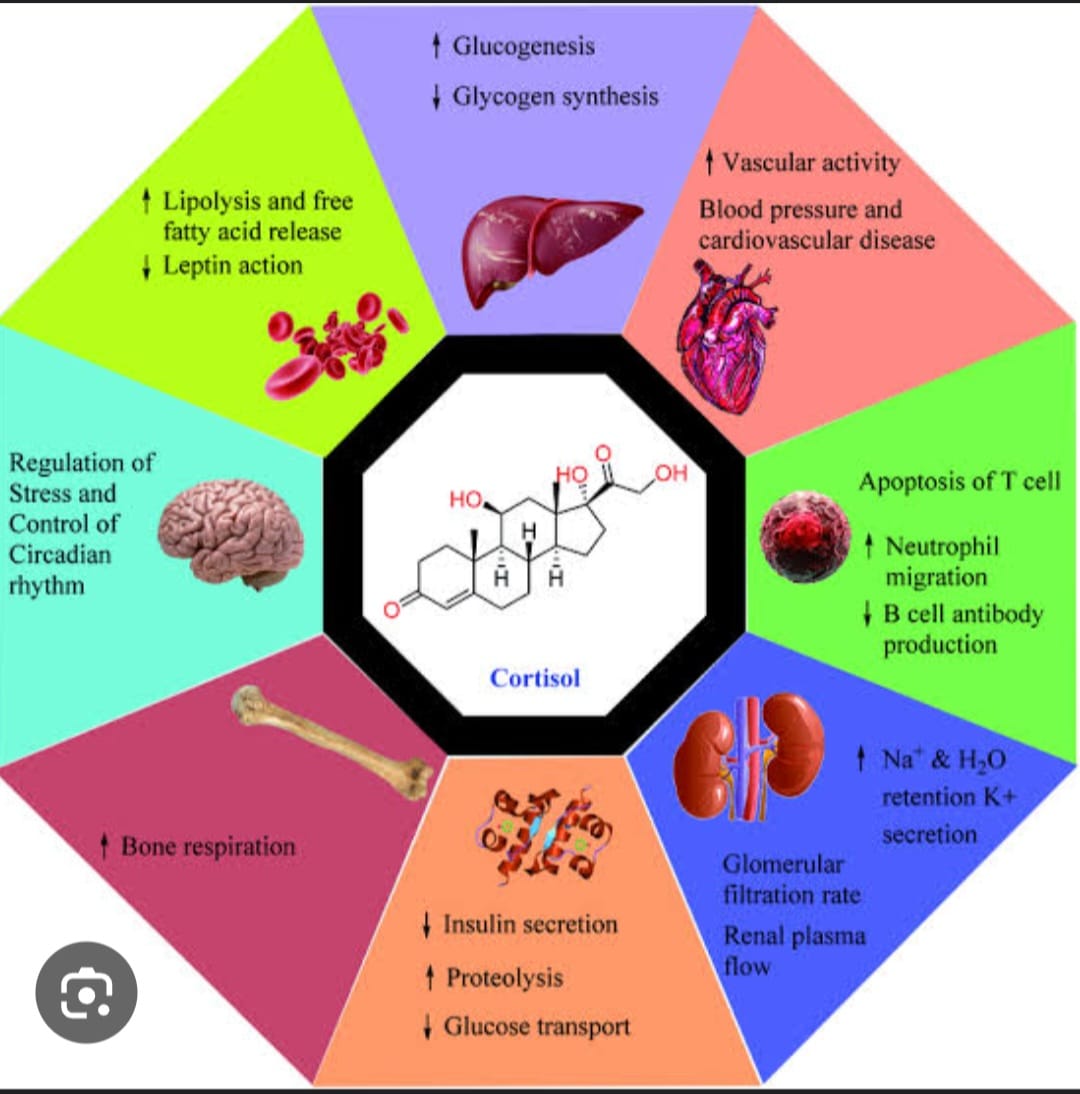When Cortisol Takes Over - A Physician’s Insight on the Hormone That Quietly Breaks Us Down

In the past two decades of practice, if I were to name one single factor that silently disturbs sleep, weight, mood, digestion, immunity, memory — and often goes unnoticed in our usual investigations — I would say it is this:
Cortisol.
Not because it is inherently harmful, but because in our modern lives, cortisol has stopped playing its natural rhythm.
It no longer rises gently with the sun and settles with the night.
Instead, for most of my patients today — it stays unnaturally high, or drops sharply, at the wrong time of day.
This imbalance creates a silent chaos that mimics everything from anxiety and insomnia to irritable bowel and emotional exhaustion.
What is Cortisol?
Cortisol is a steroid hormone released by the adrenal glands — part of our body's natural stress response system.
It is not a villain. It is a protector, designed to:
• Increase alertness in danger
• Mobilize energy during crisis
• Reduce inflammation in short-term injuries
• Help regulate blood pressure, sugar, sleep, and immunity
But like any protective system, when it’s overused or stuck in overdrive, it becomes a slow poison.
When Cortisol Goes Rogue
In the beginning, it’s subtle.
A patient tells me:
“Doctor, I feel wired but tired.”
“I can’t sleep. My mind just won’t shut down.”
“Even when I rest, I’m not refreshed.”
“I crave sugar, especially at night.”
“My waist is growing despite a strict diet.”
“My BP goes up when I’m upset.”
These are not random symptoms.
This is cortisol overriding the natural balance of the body.
And if left unchecked, it sets the stage for:
• Insulin resistance
• Thyroid dysfunction
• Immune suppression
• Menstrual irregularities
• Mental fog and anxiety
• Stubborn belly fat
In some patients, I’ve even seen elevated cortisol triggering atrial fibrillation, hypertension, and delayed wound healing.
What Triggers Excess Cortisol?
What’s striking is — it’s not just trauma or life-threatening stress.
Cortisol rises with chronic, low-grade stress, which today comes from:
• Sleep deprivation
• Social media overstimulation
• Caffeine abuse
• Conflict at home or work
• Constant multitasking
• Emotional suppression
• Worry about the future
• Physical overtraining
• Skipping meals or erratic eating
• Loneliness and disconnected living
These might seem small, but to the body — they signal danger.
And the body responds the same way it did centuries ago in a jungle:
It pumps cortisol to prepare for survival.
But survival never comes.
The danger is imagined, prolonged, digital, emotional — not physical.
So cortisol keeps circulating, disturbing everything in its path.
Clinical Observations: What I See in My Practice
Some of my most insightful diagnoses have come not from lab tests, but from listening to the language of the body.
A few patients who taught me about cortisol:
• A young corporate worker: high-functioning, always tired, unable to sleep — cortisol levels were high at night, flat in the morning.
• A middle-aged woman: with no thyroid, sugar, or cardiac issues — yet with anxiety, facial puffiness, frequent colds, and central obesity — all traced back to cortisol dysregulation.
• A school teacher: with perfectly normal ECG, but daily palpitations during early morning hours — triggered by rising cortisol levels at dawn.
In these patients, lab values were not alarming.
But their bodies were whispering — something is not right.
Signs That Cortisol Has Taken Over
You don’t need a blood test every time.
The body tells you — if you’re willing to observe:
• You wake up feeling exhausted
• You’re most alert at 10 PM
• You crave salt or sugar
• You feel anxious without a reason
• You have frequent neck/shoulder tension
• You fall asleep but wake up around 3 AM
• You feel bloated, heavy, or foggy
• You overreact emotionally, or feel numb
These are early signs that cortisol is running your system, not your natural rhythm.
How to Bring Cortisol Back to Balance
No medication can reset cortisol rhythm like the return to human rhythm.
Here’s what I recommend to my patients:
1. Sleep before midnight — ideally by 10 PM
Melatonin and cortisol are opposites. When one rises, the other falls.
2. See natural light within the first 30 minutes of waking
This one act regulates your body clock more than any tablet.
3. Breathe slowly, consciously, twice a day
Even five minutes of slow diaphragmatic breathing reduces cortisol.
4. Avoid caffeine after 2 PM
Stimulants confuse the brain’s natural signal to rest.
5. Take tech breaks
Screens trigger mental overstimulation, especially before sleep.
6. Eat regularly, calmly
Skipping meals sends a starvation signal that raises cortisol.
7. Walk — not for weight, but for calmness
Rhythmic movement calms the sympathetic nervous system.
8. Talk to someone you trust
Unspoken emotions are one of the biggest triggers of chronic cortisol elevation.
Cortisol is not your enemy.
It has protected you since birth. It still does — when used wisely.
But when it takes over… your body begins to forget what peace feels like.
As a physician, I now ask my patients not just about pain or labs —
I ask about how they wake, how they breathe, what keeps them up at night, and what lives silently in their mind.
Because sometimes, the cure is not in a prescription.
It is in slowing down, in listening within, in giving the body a chance to feel safe again.
That is when cortisol finally steps back.
And healing begins.
By Dr. Mohammed Tanweer Khan
A Proactive/Holistic Physician
Founder of WithinTheBody.com
